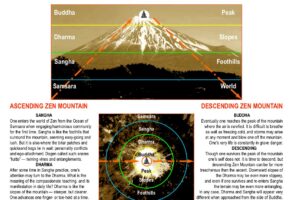
In Zen we speak of “not-knowing” as the preferred alternative to knowing, and the “don’t-know mind” as an aspiration to the highest accomplishment of human consciousness. Just to say knowing is to imply its opposite, in the conventional sense, and to raise obvious questions, such as what do we know, for sure, and what do we not know.
Knowing is usually associated with intellectual knowledge of various kinds. There is the kind of knowledge that can be gained through practice, such as how to sit in zazen or how to drive a car, involving motor muscle memory. There is the kind that can be gained through study, such as history or a second language, involving mental, or conceptual, memory. And there is knowledge of another kind, that is, knowing in the sense of apprehending our present reality, which may involve a kind of memory of past experience of previous periods of time that made a lasting impression on us, and which form a benchmark for comparison.
There is also the knowledge of how we know what we know, that is, the study of learning and consciousness itself, gained intellectually through the scientific examination of cognition, i.e. “brain science.” The study of the brain is a good example of what we think we can know, and how we can know it. Technology has been developed to allow imaging of the brain in real time, illustrating the firing of neurons in various areas of the organ theorized to control or associate with the functions of the body as well as the mind, such as memory.
When Master Dogen traveled to China as a young man, he had several encounters with senior Zen monks there, head cooks (J. tenzo), which he later recorded. In one of these the older man inquired as to why Dogen was traveling in China, which was a very arduous journey in those days. Dogen mentioned that he was interested in learning the dharma and transmitting it to others, to which the monk repeatedly asked, “What’s the use of that?” and finally, “No, I mean, what’s the long-term use of that?”
Master Dogen had to admit to himself that his reasons for learning were rather indirect and abstract, compared to what the old monk was asking. In our various studies, we should examine what is the long-term use of what we are learning. By long-term we can mean something beyond the ostensible reason for the trip we are taking at the moment, and the application of whatever knowledge we are gaining in the foreseeable future. It can even mean: what is the long-term use of our knowledge over many lifetimes?
So this question goes to the heart of all accumulated knowledge and received wisdom. What is the use, especially the long-term use, of it? In Fukanzazengi Master Dogen asserts that the Way is completely present where we are, and so questions what use it is to pursue enlightenment elsewhere, as in foreign lands, as he apparently was doing in China. Of course, we understand that there were practical reasons why he was traveling there, to bring back whatever standards of practice that he could assimilate and record. But, again, what is the long-term use of even such an admirable mission, especially in lieu of any actual, direct understanding of the dharma?
If all we are gaining is knowledge, in other words, aren’t we just wasting our time, and perhaps that of others, with our so-called Zen practice? What is really worth knowing, and worth the investment of our life and time?
Even Buddha, who was very knowledgeable in the context of his times, had to admit, finally, that he did not know what he really needed to know. So he sat down, in desperation and humility, to find out. He resolved to sit there until he had solved the fundamental koan of existence, or die trying, or so the story goes. Fortunately, for himself and others, he did not die but survived the night, intact except for his constructed self. Siddhartha Gautama did not survive; he “died on the cushion”; what rose at dawn was Buddha.
So Zen is pointing at the unknowable, that which cannot be known, in the sense that other knowledge can be. And yet it is the only thing we really need to know, it is that which is missing in our lives at present.
When we sit in zazen, just consider what it is that we know “in front of your face.” Do we really know our knowing? Do we see our seeing, hear our hearing, feel our feeling? Do we know our thinking? Or are we “thinking” our seeing, hearing, and feeling? When we enter into non-thinking, then what is seeing, hearing and feeling? What do we really know, in the present moment of knowing?
Unless we can raise this fundamental question, we may be forever caught in the internal loop of our thinking mind, thinking that we are knowing, when really we are knowing only our thinking. We know that memory plays tricks on us; we cannot rely on our memory of past experience to be unbiased and accurate. How much more can we not rely on our present awareness to be correct or complete.
As the old Buddha said when asked, “It is not thinking”; isn’t it also necessarily and ultimately not knowing, in any conventional sense? If it is actualized in non-thinking, as Master Dogen reminds us in Zazenshin, and manifested in non-interacting, doesn’t it follow that we must also come to the end of knowing? And mustn’t we get there by coming to the end of doing – ceasing to do anything at all?
If this seems impossible, just consider that we definitely know when we are thinking; thus we can know when we are not. We also know when we are doing; thus it must be possible to know when we cease doing. And we know when we are knowing; thus we can know when we are not.
Knowing when such activities cease, you may argue, is a kind of knowing. So we are forever caught in the loop. But this is because you are over-thinking it. It must be possible to remain in the state of non-thinking, observing thinking coming and going, for some time. What is it that knows that it is thinking/not-thinking? How long does it endure? It must be possible to remain in the state of non-doing and non-knowing as well, observing the coming and going of doing and not-doing, knowing and not-knowing, and ultimately being and not-being. Don’t take my word for it; study not-knowing as testified to in the last section of the wonderful long poem of the third Ancestor in China, Sengcan:
No comparisons or analogies are possible in this causeless, relationless state. Consider “motion in stillness; stillness in motion.” Both movement and stillness disappear. When such dualities cease to exist, Oneness itself cannot exist. To this ultimate finality no law or description applies.
For the unified mind in accord with the way, all self-centered striving ceases. Doubts and irresolutions vanish and life in true faith is possible. With a single stroke we are freed from bondage; nothing clings to us and we hold to nothing. All is empty, clear, self-illuminating, with no exertion of the mind’s power. Here, thought, feeling, knowledge and imagination are of no value.
In this world of suchness there is neither self no other-than-self. To come directly into harmony with this reality, just simply say, when doubt arises, “not-two”; in this “not-two” nothing is separate, nothing is excluded. No matter when or where enlightenment means entering this truth. And this truth is beyond extension or diminution in time or space; in it a single thought is ten thousand years.
Emptiness here, emptiness there, but the infinite universe stands always before your eyes. Infinitely large, infinitely small, no difference; for definitions have vanished and no boundaries are seen.
So too with Being and non-Being.
Waste no time in doubts and arguments that have nothing to do with this. One thing, all things: move among and intermingle without distinction.
To live in this realization is to be without anxiety about non-perfection. To live in this faith is the road to non-duality, because the non-dual is one with the trusting mind.
Words! The Way is beyond language for in it there is no yesterday, no tomorrow, no today.
If it is beyond language, it is beyond thinking, knowing, doing, and being. Don’t say you haven’t been told. Now it is up to you.








